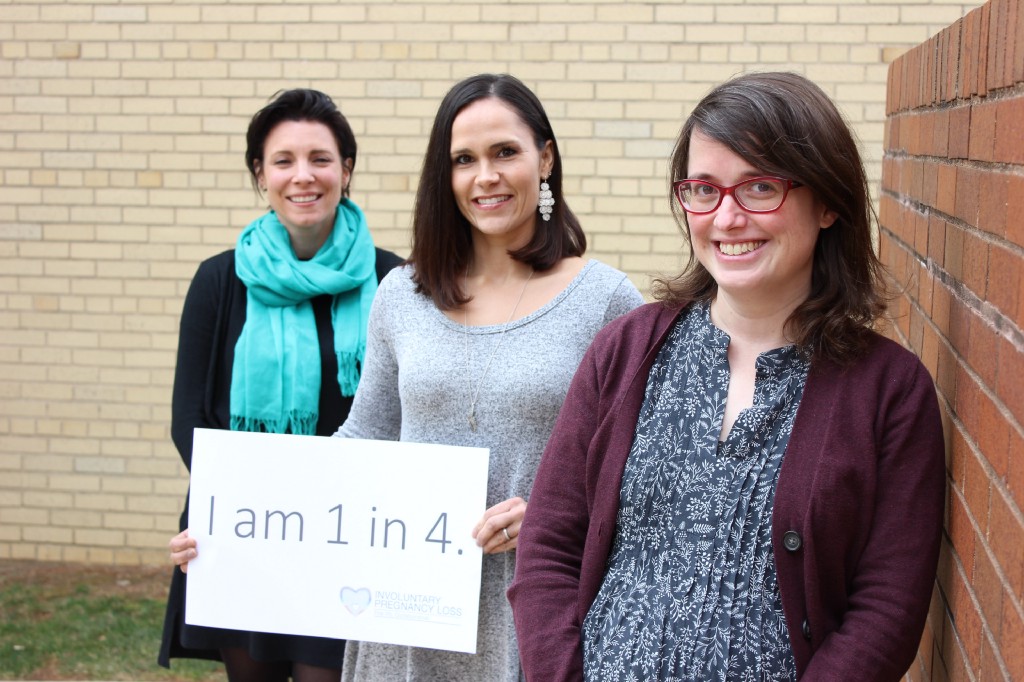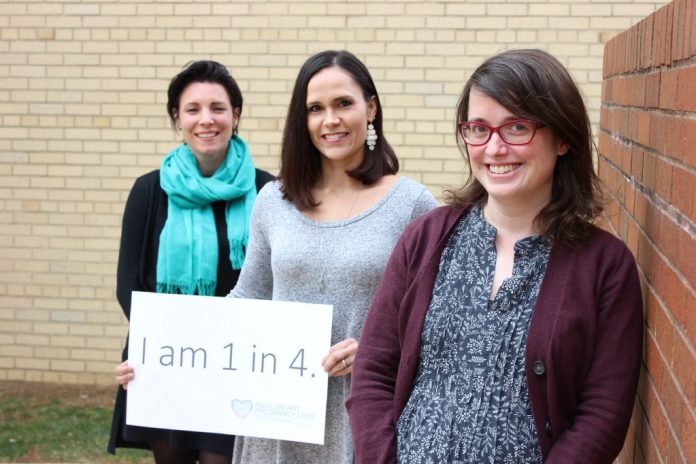The IPL Collaborative is an online resource where women can share their stories and opinions about pregnancy loss.

Three Holy Family University professors have a lot in common with Jacqueline Kennedy Onassis and so do about one in four women, they say.
Kimberly Dasch-Yee, Jenai Grigg and Stacy McDonald have never been married to U.S. presidents. They’ve never flourished at the center of a modern-day Camelot and never endured the pain of a husband’s assassination.
But like Jackie O, all three women have lost babies. All have experienced involuntary pregnancy loss, or — in common parlance — miscarriages. And they agree there should be a lot more research and conversation among women and men about the psychological and sociological ramifications of such tragic circumstances on couples and their families.
About a year ago, Dasch-Yee, Grigg and McDonald — Ph.D.’s all — launched The IPL Collaborative, an online resource where women can share their stories and opinions while taking comfort in a support system offered by a digital community. So far, dozens of women have completed the website’s scientific survey while many have contributed firsthand accounts of how they lost their babies and how the experience affected their lives.
The website IPLcollaborative.blogspot.com is free to use and open to the public. The researchers encourage women who have experienced pregnancy loss to participate.
“One purpose of the blog is to allow women a safe place to tell their stories, have validation. (It’s) to let them know that what they’re feeling, what they’re going through, is valid and other people have gone through it,” said McDonald, an associate professor of psychology. “The other component is we’d like to share empirical research that most women don’t have access to.”
One reason so little information is shared or available about pregnancy loss is the topic has long been treated as a taboo, they say. In keeping with deep-seated traditions, many women keep their pregnancies secret to their friends and even their families in the early stages, lest something go wrong.
“Our culture unknowingly sends the message to expecting parents that they should not share their pregnancy in its most vulnerable phase, suggesting not so subtly that they should not share their miscarriage, should it occur,” the women wrote in their project’s introductory statement.
Should pregnancy loss occur, despair, isolation and a lack of understanding can lead to a multitude of emotions for the expectant mother, particularly depression and guilt. Even the common term “miscarriage” and medical term “spontaneous abortion” seem to shift the focus on perceived shortcomings of the women, rather than biological or genetic factors.
“The language that the medical community uses for it, ‘spontaneous abortion,’ it’s a loaded term. My (medical) chart has two spontaneous abortions on it,” said Grigg, an associate professor of sociology.
“I think that’s part of why we’re so passionate about the topic,” said Dasch-Yee, an associate professor of psychology. “There’s this misconception that women feel that ‘I did something wrong’ and a miscarriage resulted. And that’s just not the case. We’re really trying to get a sense of how those kinds of thoughts, how cultural elements affect women’s grief. And we’re trying to do something to improve the situation for women who are experiencing this. But we have to understand the experiences of other women first.”
In addition to being colleagues, the three educators are close friends and have been sharing their personal experiences with pregnancy loss for years.
Dasch-Yee and her husband conceived for the first time in October 2012, but lost their baby about six weeks into the pregnancy. They had known of the pregnancy for only about two weeks, but the experience affected them profoundly when they conceived again early in 2013. Despite their heightened anxiety, Dasch-Yee gave birth to a girl in December 2013. She delivered twin boys earlier this spring.
Grigg was in her mid-30s when she gave birth to her first child, a daughter, in 2010. About a year later, she and her husband conceived again, but lost the baby. In 2013, they experienced another pregnancy loss in the ninth week, but they knew they still wanted a second child. With some encouragement from a midwife at their birth center, they decided to try again. Ten months later, Grigg gave birth to a healthy son.
McDonald and her husband had daughters ages 6 and 4 when she became pregnant again early last year. For several years, she and Grigg had chatted about and contemplated the idea of launching an academic study of pregnancy loss. Then about 15 weeks into her new pregnancy, McDonald’s baby died in the womb as a result of a genetic condition.
“After I had my miscarriage in May, I remember walking down the street talking with Janai while crying and she said, ‘Are you ready to do research?’ And I said, ‘Absolutely,’” McDonald recalled. “I really feel we didn’t find this topic. This topic found us. This is our mission, our purpose. We’re three colleagues who happen to be three friends who all have had pregnancy loss experiences.”
To read more about the Involuntary Pregnancy Loss Collaborative, access Holy Family’s Values magazine online at issuu.com. ••
William Kenny can be reached at 215–354–3031 or [email protected]. Follow the Times on Twitter @NETimesOfficial.





